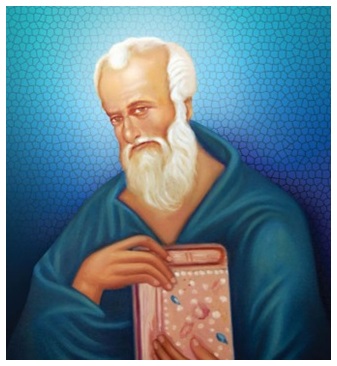ST. JOHN THE APOSTLE AND EVANGELIST
The Apostle and Evangelist St. John, called the Theologian, was the son of Salome and Zebedee. Zebedee was a fisherman of Galilee who possessed rather vast holdings with workers. He was a member of some importance in the Jewish community, having access to the high priest. John's mother Salome is mentioned as being one of the ranks of women who served God with their possessions.
Being a steadfast disciple of the Lord, he and his brother James were called by the Lord Himself at a later time after a successful catch of fish in the sea of Galilee. Together with Peter and James, John was deigned worthy to become close to the Lord, being with Him during the most important and triumphant times of His earthly life. Thus, he was worthy to be present at the resurrection of the daughter of Jairus, to see Christ's transfiguration on Mount Tabor, to hear the discourse on the signs of His second coming, and to witness to His prayer at Gethsemane. At the Last Supper he was so close to the Lord that in his own words, he lay his head upon Christ's bosom, whence originated his name "bosom-friend," which has since become a name for someone who is especially close.
Out of humility, not calling himself by name but nevertheless speaking of himself in the Gospel, he refers to himself as the disciple "whom Jesus loved." The Lord showed this love of him when He was on the cross—He entrusted His Most Holy Mother to him saying: "Behold thy mother."
Zealously loving the Lord, John was filled with indignation at those who were hostile to the Lord or who estranged themselves from Him. While traveling through Samaria he prohibited those who did not walk with Christ to cast out demons in the name of Jesus Christ (cf. Mk. 9:38), and asked the Lord's permission to consume with fire certain residents of a Samarian town for not accepting Him (cf. Luke 9:54). For this he and his brother James were called by the Lord "sons of thunder" (Boanerges). Feeling the love of Christ toward himself, but as yet not enlightened with grace by the Holy Spirit, he decides to ask for himself and his brother James a place close to the Lord in His future Kingdom and learns of the impending sufferings for both of them.
After the Lord's Resurrection, we often see Apostle John together with Apostle Peter, together with whom he is also considered a pillar of the Church, and with whom he often travels to Jerusalem. True to the Lord's command, he cared for the Holy Virgin Mary as a most devoted son, and only after her Blessed Dormition did he begin to preach in other lands.
During Apostle John's ministry, one notices that he uniquely chose for himself a specific province and directed all the energy of his soul to eradicate paganism there and strengthen the holy faith. As an example of his specific care were the seven Churches of Asia Minor—in Ephesus, Smyrna, Pergamos, Theatira, Sardis, Philadelphia and Laodicia. He lived mainly in Ephesus.
On seeing the Apostle, the youth became embarrased and began to run away. John pursued him and with touching words of love encouraged him. He finally brought him to Church, shared with him the labors of repentance, and did not rest until he had totally reconciled him with the Church. During the last years of his life the Apostle preached only one precept: Children, love one another. His disciples asked : "Why do you repeat yourself?" Apostle John answered: "This is the most important commandment. If you will fulfil it, then you wil fulfil all of Christ's commandments."
This love would turn into a fiery fervour when the Apostle met false-prophets who corrupted the faithful and deprived them of eternal salvation. In one public building he met the false prophet Cerinthus who denied the Divinity of the Lord Jesus Christ. "Let us depart quickly" said the Apostle to his disciple "I fear this building might collapse around us."
St. John the Theologian died a natural death (the only one of the Apostles to do so), being around 105 years of age, during the time of Emperor Trajan. The circumstances of the Apostle's death appeared unusual and even puzzling. At his own insistence, the Apostle John was buried alive. On the following day, when the tomb was unearthed, it turned out to be empty. This event affirmed the belief in the conjecture of some Christians that Apostle John will not die but will live until the Second coming of Christ and that he will unmask the Antichrist. The words said by the Saviour not long before his Ascension gave them cause to surmise this. When the Apostle Peter asked after turning to the Apostle John, And what shall this man do? the Lord answered, If I will that he tarry till I come (the second time), what is that to thee? Follow thou me. Apostle John makes a notation regarding this in his Gospel: Then went this saying abroad among the brethren, that that disciple should not die (Jn. 21:22-23).
